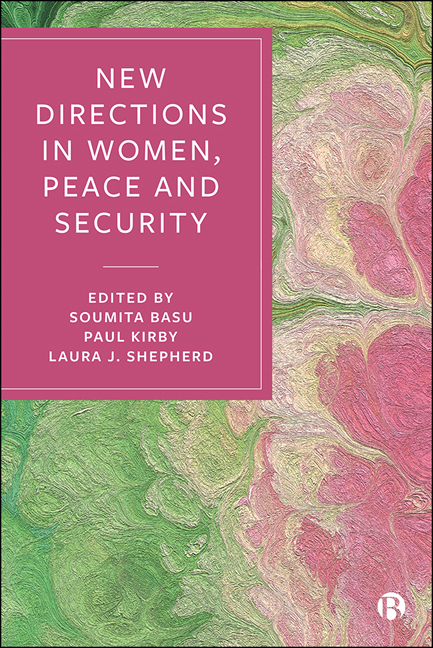14 - Feminist Challenges to the Co-optation of WPS: A Conversation with Joy Onyesoh and Madeleine Rees
Published online by Cambridge University Press: 12 March 2021
Summary
The Women's International League for Peace and Freedom (WILPF) spearheaded women's efforts leading to the passage of UNSCR 1325 in October 2000. Founded in 1915 initially as a women's committee to stop the First World War, WILPF is now the longest-operating international women's peace organization in the world. Its involvement with the WPS agenda was premised on its identity as a feminist peace organization. As such, its ultimate goal has always been the elimination of war itself or, short of that, at least the establishment of gender-attentive systems for the just and nonviolent management of conflicts.
Like the other women's organizations that together worked to make UNSCR 1325 happen – and that coordinated themselves into the NGO Working Group on WPS to lobby the Security Council – WILPF was under no illusion about women's innate peacefulness. Rather, the organization insisted that women's experiences and voices, as well as feminist analysis, be included when attempting to counter violent conflict – from prevention, to post-conflict transitions, to peace processes – and in all locations where violence created situations of insecurity. This inclusion represented, in WILPF's view, a necessary step to achieve lasting peace, an ideal that they refer to as feminist peace (WILPF, 2018).
Once the resolution passed, WILPF started to work towards implementation. In parallel to WILPF's and other organizations’ efforts, feminist scholars have analysed and critiqued the WPS agenda. Based on analyses of the process leading to the passing of UNSCR 1325; the language of the different WPS resolutions; and experiences with the implementation of WPS agenda (for example, Cohn et al, 2004; Cohn, 2008; Basu, 2016; Hagen, 2016; Kirby and Shepherd, 2016; Duncanson, 2019), they have advanced three kinds of critiques: first, they have found fault in WPS’ subordination of women's antimilitarist agenda to states’ security agenda; second, they have criticized how WPS understands women and gender as synonyms; and, third, they have objected to a focus on liberal rights often adopted in its implementation.
In this chapter, Madeleine Rees and Joy Onyesoh – WILPF Secretary General and International President of WILPF respectively – reflect on their first-hand experience of feminist advocacy on WPS over almost two decades, drawing particularly on WILPF's work in Nigeria and transnationally.
- Type
- Chapter
- Information
- New Directions in Women, Peace and Security , pp. 223 - 246Publisher: Bristol University PressPrint publication year: 2020

